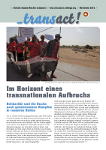(Übersetzung Seite 1 transact-2)
Left-wing movements currently have more questions than answers
When a series of large banks collapsed like houses of cards last year, at first economic experts took the lead within left-wing debates. Two issues took centre-stage in their analyses: firstly, how large-scale financial markets developed as a result of the serious overaccumulation crisis and other factors since the early 1970s. Secondly, how the global financial industry since then – and despite temporary crises such as 1987 and 2000 – has grown ever more rapidly until the credit-financed betting pyramides finally collapsed and this strange financial bonanza came to an end for the time being. However, it soon became apparent that a strictly economic and ‘Wertkritik’1orientated analysis was insufficient – simply because financial markets had not achieved such scope and power of their own accord. They were – or rather are – part of the that is known as neoliberal globalisation, an offensive instituted as a class project from above in the early 1970s, not least in reaction to the turbulences in which Fordist capitalism had found itself from the mid- 1960s on. Broadening the perspective in that way was important in order to highlight the central role that social struggles play in the dynamics of broad social development. More concretely: the crisis of Fordism cannot be understood without reference to the relatively successful class struggles of the 1950s and 1960s within the Fordist class compromise in which the resistance of workers meant that the overaccumulation crisis could not be off-set at the expense of labour either through wage decreases or the intensification of the labour process. But also the globalisation offensive has in no way been smooth. Quite to the contrary: a further cycle of struggles developed, both in rich industrialised countries as well as in the global south. This conflict dynamic only died down in the 1990s or ended in a series of defeats, particularly within the global workers movement.
A further shift in emphasis with respect to struggles has developed since global rescue packages for supposedly suffering banks were announced and the crisis began to affect the so-called ‘real economy’. Because now social struggles pushed themselves inadvertently into the forefront as an immediate challenge in the present: On the one hand, because it had become apparent that the bill would have to be footed by the mass of the people, something that the central slogan at the large demonstrations on March 28th: ‘We won’t pay for your crisis’, pointed out; on the other hand, because threats such as mass redundancies and displacements across the globe had appeared early on. The current level of tensions is expressed in conflicts such as the recent factory occupations in the US and the UK, the general strike in France, or the (successful) hunger strike of agency workers at Volkswagen in Wolfsburg in Germany. In other words: Since the beginning of 2009, the social question has thrust itself back into the centre of left-wing analyses and strategic debates – much more so than during the social protests of 2003/4 in Germany.
No less apparent, however, is that the movement-orientated left currently has more questions than answers. In particular, four issues have emerged: First, it cannot be denied that the left [in Germany] has little to no experience with social struggles. This is not compensated for by participation in anti-racist struggles for the right of residence, the long years of participation in social forums or the support of strikes, e.g. in the case of AEG in Nuremburg or the retail industry in Berlin. What is missing are continuous projects and support structures that can intervene spontaneously and flexibly, or that can take the initiative themselves. Second, the engagement with precarity threatens to become a more or less sub-cultural issue or mere re-affirmation of group identities. In any case, there has not yet been much success in building bridges between the laptop-precariat and paperless migrants. Third, there needs to be a recognition, even if it is painful, that the mass of the precarious are not very willing to strike or protest. It seems that fear and insecurity are dominant, which is surely also the result of numerous defeats over the last 20-30 years. Fourth, the question arises as to what kind of programme we need to engage in social struggles: A mass orientation, even if it has nationalist or protectionist overtones, or the strengthening of a global perspective, i.e. the right of all people to the same rights and material access? This is a question that is not only controversial within trade unions but that also played an important role in the crisis demo on March 28th in Germany, where Oskar Lafontaine, an openly declared national Keynesian, spoke on behalf of the Left Party.
The dual intentions of this newspaper can be explained against this backdrop: On the one hand, we would like to express our conviction that the undogmatic left’s response to the crisis must be to initiate as well as to strengthen and support local struggles. As important as large symbolic events such as the crisis demonstration of March 28th are, we will only be able to come out of our defensive position if we manage to create social connections and thus temporary autonomous zones and associations across the various social contradictions. On the other hand, we would like to offer tips, arguments and positions that appear important to us, particularly with respect to our experiences in anti-racist struggles. Of particular concern for us is the rejection of all forms of chauvinistic or nationalistic policies of competition and insulation. The crisis must not lead to the creation of new lines of division that are regulated by the state or civil society. This applies domestically as well as internationally (whereby, of course, we include ecological fault lines). We need to put social struggles at the centre of our organising, in other words: global social rights against the crisis!






